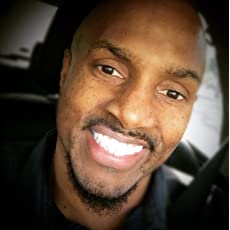An Interview with Author Cedrik O'Brian
We had the pleasure of interviewing Cedrik O'Brian, author of "Why I Cry Burgundy Tears", who is living with multiple myeloma.
Meet Cedrik!
 My name is Cedrik O’Brian Wallace and I live in Los Angeles, California, where I am a 20 plus year educator at James A. Garfield High School (LAUSD). Yes, from the popular movie, Stand and Deliver. I dabbed a bit in writing as a college newspaper Feature’s Editor & Columnist at Whittier College while earning my BA through the Whittier Scholars Program. A program where I was allowed to develop my own education plan which included Anthropology, Communications, Social Work, and Education. Went on to earn a Master's in Special Education.
My name is Cedrik O’Brian Wallace and I live in Los Angeles, California, where I am a 20 plus year educator at James A. Garfield High School (LAUSD). Yes, from the popular movie, Stand and Deliver. I dabbed a bit in writing as a college newspaper Feature’s Editor & Columnist at Whittier College while earning my BA through the Whittier Scholars Program. A program where I was allowed to develop my own education plan which included Anthropology, Communications, Social Work, and Education. Went on to earn a Master's in Special Education.
It wasn’t until after my bout with multiple myeloma cancer that I was inspired to write, poetically. In 2014 I began writing down notes, quotes, and poetic writings. Soon after, I started sharing my words on Instagram under the username @poeticsoldier (fighting cancer with poetry). My words revolve around my journey with cancer and life after cancer.
I also write about family, the workplace, education, relationships, self-love, social injustice, and motivational/inspiring pieces. It took off as people really responded. I was voted a top 100 inspiring Instagrammer in 2017. By late 2018, I had several of my poems published in various publications and self-published two books, the first being Why I Cry Burgundy Tears, a memoir of sorts, centering around my journey with multiple myeloma.
Interview with Cedrik
When were you diagnosed with multiple myeloma and what was your initial reaction?
Cedrik: I was diagnosed in June of 2012 at the age of 40. Stage three. I was in shock, to say the least. I started to cry instantly and my oncologist sat there and allowed me to let it all out. I asked questions such as, “Why?”, “Why me?”, “What does this mean?”, etc. I was a healthy individual who didn’t smoke or drink, ate well, and loved working out/exercising. My family did not have a history of any kind of cancer. Therefore I was confused.
How has writing poetry helped you in coping with your diagnosis?
Cedrik: Two years after my diagnosis and a year of being in remission, I was feeling good, physically, but mentally I was traumatized and having a hard time dealing with “life after cancer.” Much was different. My life had changed. Lots of good and some bad. The side effects of the ongoing treatments affected the quality of my life. I found myself doing lots of social distancing and self-time. I began to write down notes and quotes about my feelings in regards to my journey with cancer. That lead to poetry and it felt good! I was letting go. I was healing. It brought conversations with others dealing with similar pain and illnesses. I was being told that I was inspiring others. I’m still healing and it still feels good, now because I’m helping others as they help me with their art and their stories.
What is your favorite poem you’ve written? What inspired you to write it?
Cedrik: My favorite poem is the very first one I ever wrote, Why I Cry. This poem also inspired the title of my first book. My bout with cancer inspired me to write. (read more above).
You were voted “Top 100 Inspiring Instagrammers 2017”! What did that recognition mean to you?
Cedrik: That recognition humbled me quick. I didn’t realize that my words were reaching such an audience and inspiring them. A coworker once told me, “Now you know what your purpose is.” Ever since, I’ve used the phrase, “live to inspire” and the hashtag, #livetoinspire in my social media posts. It’s fitting.
What advice would you give someone who was newly diagnosed with multiple myeloma?
Cedrik: I’d tell them not to go crazy researching everything and listening to everyone and their “expertise” because it adds confusion, stress, and anxiety. Stress is a major fact and must be kept under control. Write down or have a caregiver write down notes/questions and ask the questions to a select few(doctors/staff and people who have experienced your experience). Accept help when it is offered and stay as positive as you can throughout the process.
Do you have a favorite article on Blood-Cancer.com? What about it resonated with you?
Cedrik: I like it all but what I pay attention to is the relatable but real-time stuff such as the posts on side effects (chemo brain, fatigue, etc).
Leave a message for Cedrik in the comments below!

Join the conversation